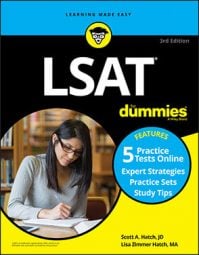This is a writing topic that could appear on the LSAT. This topic deals with whether the state should fund a large sporting retailer to come to the area. Read the prompt and pick your side.
A small southern town is trying to decide whether to provide financial incentives to a large national retailer that wants to open an outlet there. Town business leaders are considering offering funds raised by state taxes to pay for the store’s construction. Write an argument either supporting or protesting offering the financial incentives, keeping two guidelines in mind:
The town wants to create jobs by bringing tourist dollars to the area.
The town wants to avoid putting local merchants out of business.
Town business leaders want to use state taxes to pay for the construction of the national retailer’s multimillion-dollar facility right next to an exit from an interstate highway. The facility would include a giant sporting goods store, several restaurants, and a hotel.
It would create at least 300 new jobs, and the town hopes that it would also attract tourists who otherwise would not bother leaving the highway. If the town does not provide the tax funds, the retailer will probably take its business elsewhere.
Local merchants in the town do not want to use state funds to finance the facility’s construction. They claim that local retailers already provide all the goods that would be available at the new store, and they fear that the new store would deliberately cut its prices to drive them out of business.
They believe it would be wrong for the state to fund the construction of a store for an out-of-town retailer when it does not provide the same service to local businesses. They insist that the town should treat the out-of-town retailer the same way it treats local merchants.
Sample answer: Use state funds
Here’s a sample answer that argues for using the state funds:
The benefits of bringing this large national retailer to the town are tremendous, and the town should do whatever is necessary to persuade the company to come. If that means the town’s leaders offer to pay for the facility’s construction with state tax funds, then they should do it because the benefits of having the retailer move in far outweigh the cost of using state money to build the store.
The retailer would build a huge, multimillion-dollar facility just off an interstate exit. That exit would become a major destination; people who would otherwise never consider stopping in the town would have a reason to get off the highway and spend their money there. After these people have stopped, it will be easier to convince them to stay and spend even more money, perhaps on amenities in town.
Introducing the retailer would create hundreds of new jobs. First, construction workers would have ample employment. Second, all the facilities that would be part of the retailer’s complex — the sporting goods store, the several restaurants, the hotel — would require a large number of employees. These would be good, stable jobs, and the local economy needs that.
The town has several sporting goods stores and of course hotels and restaurants, but all are not located in one convenient place; people must drive around to get to them, and they will never attract anyone from out of town. The local merchants already have a loyal clientele; regardless, it is unfair to force local customers to pay prices for goods that the major retailer can sell for less.
Bringing the retailer to town would be a win-win situation for nearly everyone. The town should bend over backward to persuade it to come; spending tax money to build the facility would be an investment with huge payoffs in the near future.
Sample answer: Don’t use state funds
Here’s a sample answer for the other side:
Offering to pay for the construction of this retailer’s facility is a terrible idea. Because the potential consequences to the town’s local merchants are horrific and the likely economic benefit to the town of the retailer’s locating there is unproven at best and negligible at worst, the town should definitely not subsidize the store’s construction with state funds.
The town should not pay to construct the national retailer’s monstrous facility because to do so would be extremely unfair to local merchants. Local merchants have to pay their own way; no one has ever offered to build facilities for them. To add insult to injury, if the town does decide to use state taxes, then local merchants will in effect be forced to finance the construction of a competitor.
Countless towns have proven that introducing large national retailers with big-box stores is devastating for local merchants. The national retailers carry a larger variety of merchandise with prices set specifically to drive local merchants out of business. There is no reason to assume this retailer would be different.
If this retailer comes to town, customers will flock there, abandoning the merchants who already operate in the heart of town. As for tourists, perhaps a few interstate travelers will get off the highway to do a little shopping or have a quick meal, but they are unlikely to venture into town. Nothing about a big-box sporting goods store will impress them with “local color.”
Although this retailer would provide a certain number of jobs, they would be low-paying jobs in an isolated area around a remote interstate exit. They would come at the cost of the jobs that already exist with the town’s local sporting-goods merchants. All profits would leave the state to go to corporate headquarters, leaving the town with a hefty construction bill and 300 minimum-wage jobs with no security.
If the national retailer is serious about coming to this town, it can pay its own way like any other honorable vendor. There’s no sense in the town’s subsidizing its own economic destruction.

